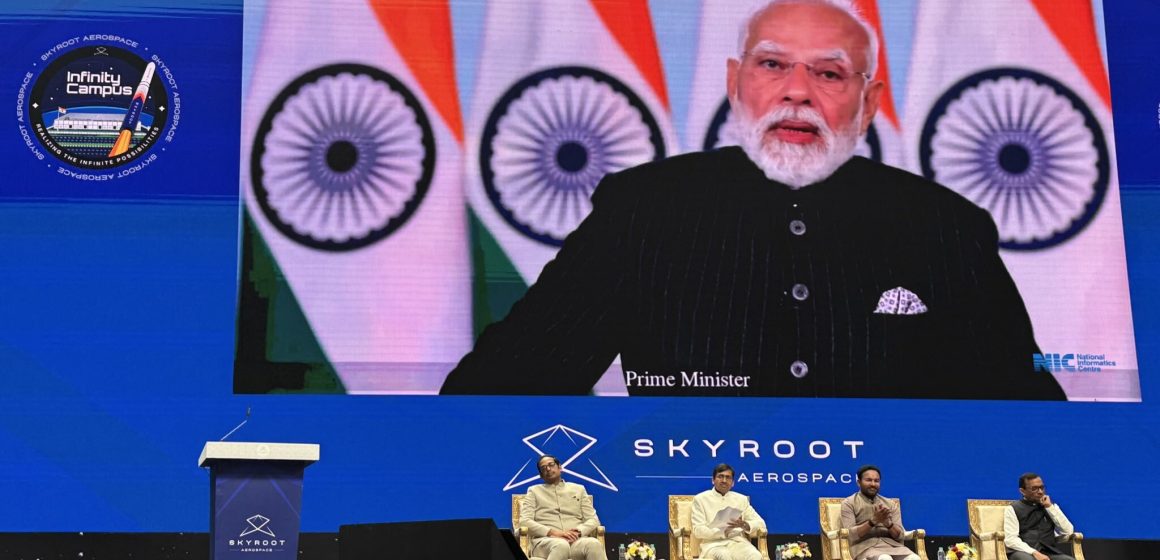The Prime Minister also unveiled Vikram‑1, Skyroot’s flight‑ready private commercial rocket, capable of deploying multiple payloads of up to 350 kg in Low Earth Orbit (LEO) in a single mission.
India’s fledgling spacetech sector crossed a major milestone with the inauguration of launch vehicle maker Skyroot Aerospace’s sprawling rocket factory in Hyderabad on Thursday, nearly five years after the country announced the opening of the space sector to private players.
Spread over 200,000 square feet, the state‑of‑the‑art facility can turn out a rocket a month. The seven‑year‑old company is looking to leverage this to make a significant presence in the $21.2 billion global launch services market (2025), while also increasing India’s share in the segment.
Lauding company founders Pawan Kumar Chandana and Naga Bharath Daka, Prime Minister Modi said the event marks a giant leap in India’s space ecosystem.
“The innovation, risk‑taking ability, and entrepreneurship of our young people are reaching new heights today. And today’s event is a reflection of the fact that Bharat will emerge as a leader in the global satellite launch ecosystem in the coming times.”
The success of companies like Skyroot has inspired many more to enter the spacetech sector. From just a handful five years ago, the industry now boasts over 350‑plus startups.
Acknowledging this, Prime Minister Modi noted, “Today, Gen‑Z engineers, Gen‑Z designers, Gen‑Z coders, and Gen‑Z scientists are creating new technologies. Whether it is propulsion systems, composite materials, rocket stages, or satellite platforms, Bharat’s youth is working in areas that were unimaginable just a few years ago. Bharat’s private space talent is establishing a distinct identity across the world.”
Prime Minister Modi also unveiled flight‑ready Vikram‑1, the country’s first private commercial rocket developed by Skyroot, on the occasion. Designed and developed in‑house in under four years, the launch vehicle is capable of deploying multiple payloads of up to 350 kg in Lower Earth Orbit (LEO) in a single mission.
Other technological firsts for a privately built launch vehicle include a body made entirely from carbon fibre for superior strength‑to‑weight performance, 3D‑printed hypergolic engines, and a Kalam‑1200 booster stage built with advanced carbon composite materials.
Founded in 2018 by IITians and former ISRO scientists Chandana and Daka, the company first made history in 2022 by launching India’s first private rocket, Vikram‑S. The technologies proven in Vikram‑S accelerated the development of Skyroot’s larger orbital‑class rocket, Vikram‑1. The 1,000‑employee‑strong Skyroot is backed by marquee global investors such as GIC and Temasek, raising nearly $100 million to date.
On‑Demand Launches
The factory’s inauguration brings Skyroot founders even closer to disrupting the global satellite launch market by their shared dream of offering on‑demand launch services, or as they often like to describe it, a “cab service to space for small satellite operators.”
A usually composed Skyroot Co‑Founder & CEO, Chandana, excitedly observed, “This is a proud moment for Skyroot. There is no stronger signal of India’s intent to support and establish a robust private sector than the Honourable Prime Minister’s inauguration of India’s largest private rocket factory.”
Echoing Chandana’s sentiment, Co‑Founder & COO, Daka added that the moment wouldn’t have arrived without the New Space Policy released in 2023, which has empowered startups like theirs to dream big and execute boldly.
“The new factory expands our capability and strengthens our resolve to build launch vehicles that will open space for all—from India to infinity!”
The Infinity Campus is equipped with first‑in‑class aerospace capabilities in India’s private space‑tech industry, including automated filament winding systems, precision computer numerical control (CNC) machines, cleanrooms for carbon composite processes, and more. It will complement Skyroot’s existing 55,000‑square‑foot Max‑Q Campus, built for integrated rocket design and development.
It is, however, Pawan Goenka, Chairman of the Indian National Space Promotion and Authorization Centre (IN‑SPACe), India’s space regulator and promoter, who summed up the moment the best.
“The Infinity Campus and Vikram‑1 are testaments to what can be achieved when entrepreneurial ambition meets enabling policy. We are building more than rockets. We are building a competitive space economy.”
– Manish Pant


